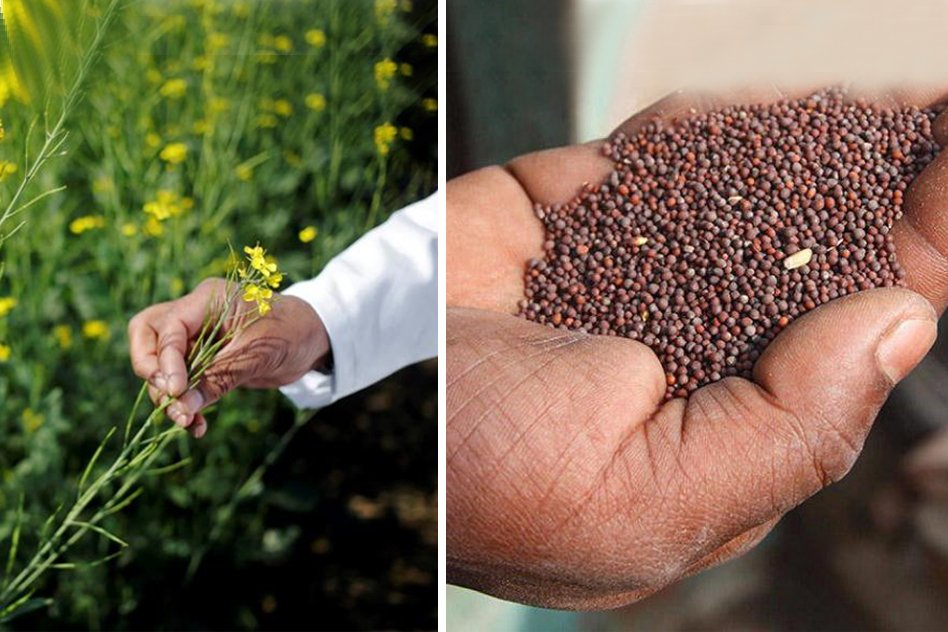Description

Copyright infringement not intended
Picture Courtesy: thelogicalindian.com
Context: The controversy surrounding GM mustard in India has reached the Supreme Court due to concerns and opposition from activists and NGOs, leading to a plea for a moratorium on the release of any genetically modified organisms (GMOs) into the environment.
Details
Development of GM Mustard
Hybridization Challenge
- Mustard plants are typically self-pollinating, which complicates traditional hybridization methods.
- The hybrid mustard DMH-11 was developed by the Centre for Genetic Manipulation of Crop Plants (CGMCP) at Delhi University.
GM Technology Used
- Genetic modification involved the introduction of two alien genes from a soil bacterium called Bacillus amyloliquefaciens.
- The first gene ('barnase') renders the plant male-sterile by impairing pollen production.
- The second gene ('barstar') blocks the action of barnase, allowing the plant to produce seeds.
- The resulting hybrid, DMH-11, showed a claimed 28% yield increase over traditional varieties.

Supreme Court's Involvement
Technical Experts Committee (TEC) Reports
- The Supreme Court questioned why the Genetic Engineering Appraisal Committee (GEAC) did not consider the reports of the court-appointed Technical Experts Committee on biosafety before approving the release of DMH-11.
- The TEC reports likely contain information on the environmental and health impacts of GM crops.
Public Safety Concerns
- Activists and NGOs argue for a moratorium until a comprehensive, transparent, and rigorous biosafety protocol is established.
- They insist on independent expert bodies conducting studies, with results made public before any GMO release.
Center's Response
- The Center seeks withdrawal of an oral undertaking given in November 2022 about not pressing ahead with commercial cultivation of GM mustard.
- The Supreme Court ordered a status quo on the GEAC's decision, expressing concerns about risk factors.
GEAC Approval Process
- GEAC recommended the environmental release of DMH-11 for seed production and testing before commercial release.
- The approval also included the release of DMH-11's parental lines for developing new hybrids with potentially higher yields.
Concerns and Opposition
Herbicide Tolerance
- Opposition to the presence of a third 'bar' gene, making GM mustard tolerant to the herbicide glufosinate-ammonium.
- Concerns about the displacement of manual labour in weddings due to increased herbicide use.
Impact on Pollinators
- Concerns about the impact of GM mustard on honey bees and other pollinators.
- GEAC cited an expert committee report stating that the technology is unlikely to adversely affect pollinators.
Edible Oil Import Motivation
- The acceptance of GEAC recommendations could be driven by India's high edible oil import bill.
- GM mustard aims to increase domestic production, reducing the need for imports and the associated foreign exchange outgo.

Conclusion
- The Supreme Court is examining the approval process of GM mustard, considering biosafety concerns, public safety, and potential impacts on agriculture and the environment. The controversy reflects broader debates over the acceptance of genetically modified crops in India.
Must Read Articles:
GM Mustard: https://www.iasgyan.in/daily-current-affairs/gm-mustard
GM Mustard Debate: https://www.iasgyan.in/daily-current-affairs/gm-mustard-debate
|
PRACTICE QUESTION
Q. What are the key controversies and debates surrounding the introduction and cultivation of GM mustard, and what are the potential implications for agriculture, the environment, and public health?
|











